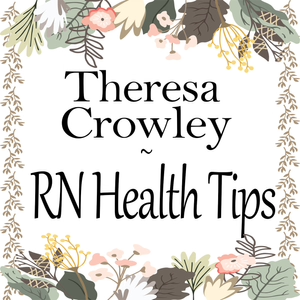
Perimenopausal Women’s Biggest Struggle: Weight Gain. Why it Happens and How to Reduce
03/15/22 • 32 min
Perimenopausal Women’s Biggest Struggle: Weight Gain
Why it Happens and How to Reduce
One of the biggest frustrations of many Perimenopausal women is the weight gain and the struggle to lose it. No matter how much you exercise or eat healthy, it just doesn’t seem to want to come off your body. Why does this happen?
During perimenopause and menopause, our hormones are fluctuating and out of balance. Women have 3 main hormones: Estrogen, progesterone and testosterone that seem to decrease as we age for most or you could have high estrogen causing lower progesterone. But we tend to forget two other body hormones that are key players during perimenopause: Cortisol and Melatonin.
Cortisol is known as the stress hormone. It regulates and plays a key role in the body’s response to stress. Too much cortisol is bad. When your cortisol levels remain high for an extended period (during a stressful time in your life), you will gain weight through the middle of your body “spare tire”. Elevated cortisol can cause other health issues as well.
Melatonin regulates our sleep and is produced in the pineal gland. This hormone declines with age but it is important as it allows your body to properly respond to the circadian rhythms of day and night cycles. If you are sleeping well, this allows the cortisol hormone to dip lower and not remain elevated while you sleep.
How to reduce this weight gain during perimenopause:
1) Reduce your stress so you can reduce cortisol levels
2) Have your hormone levels checked by a doctor to see what is off-balance
3) Move your body-gently. No high intensity exercise or beating your body up because you are frustrated
4) Don’t obsess about your weight- this causes mental stress
5) Be kind to your body. Do some self-care
Instagram: @thrivinginmidlife
www.cherylbeckesch.com
Perimenopausal Women’s Biggest Struggle: Weight Gain
Why it Happens and How to Reduce
One of the biggest frustrations of many Perimenopausal women is the weight gain and the struggle to lose it. No matter how much you exercise or eat healthy, it just doesn’t seem to want to come off your body. Why does this happen?
During perimenopause and menopause, our hormones are fluctuating and out of balance. Women have 3 main hormones: Estrogen, progesterone and testosterone that seem to decrease as we age for most or you could have high estrogen causing lower progesterone. But we tend to forget two other body hormones that are key players during perimenopause: Cortisol and Melatonin.
Cortisol is known as the stress hormone. It regulates and plays a key role in the body’s response to stress. Too much cortisol is bad. When your cortisol levels remain high for an extended period (during a stressful time in your life), you will gain weight through the middle of your body “spare tire”. Elevated cortisol can cause other health issues as well.
Melatonin regulates our sleep and is produced in the pineal gland. This hormone declines with age but it is important as it allows your body to properly respond to the circadian rhythms of day and night cycles. If you are sleeping well, this allows the cortisol hormone to dip lower and not remain elevated while you sleep.
How to reduce this weight gain during perimenopause:
1) Reduce your stress so you can reduce cortisol levels
2) Have your hormone levels checked by a doctor to see what is off-balance
3) Move your body-gently. No high intensity exercise or beating your body up because you are frustrated
4) Don’t obsess about your weight- this causes mental stress
5) Be kind to your body. Do some self-care
Instagram: @thrivinginmidlife
www.cherylbeckesch.com
Previous Episode

Understanding Disordered Eating: How the Diet Culture and Your Past Affects Your Relationship with Food
As women, many of us suffer from having disillusioned ideals of body image with a strong focus on diet and weight loss as the answer. But if our relationship with food is not “healthy”, we likely are feeling like we are on this cycle with no resolve. Our societal pressures and our past may affect the relationship we have with food; good and bad.
What is your relationship with food? Do you suffer from disordered eating?
What is “disordered eating”? Disordered eating, according to Mindy, is misguided behavior driven by misguided information.
Understanding Disordered Eating: How the Diet Culture and Your Past Affects Your Relationship with Food
GUEST:
Mindy Gorman Plutzer is a nutrition consultant, certified holistic health coach and eating psychology coach. Working in the weight management industry for 19 years, she has combined her background, trainings in holistic health, transformational coaching, and eating psychology with her extensive life experience to create The Freedom Promise, a private coaching practice.
Mindy has worked with hundreds of clients to transform their relationship with food from one mired in toxic and limiting beliefs to one that is joyous, loving and free. She introduces strategies that are a combination of practical coaching techniques, results-oriented psychology, clinical nutrition, body-centered practices, mind-body science, and a positive and compassionate approach to challenges with food, weight and health. Clients experience results that are nourishing, doable, and sustainable.
Instagram: @thefreedompromise
Facebook: The Freedom Promise
Book available on Amazon: The Freedom Promise: 7 Steps to Stop Fearing What Food Will Do to You and Start Embracing What It Can Do for You
Next Episode

Self-Acceptance of Our Bodies: How to Love Your Body
Many women struggle with self-acceptance of their physical bodies.
We must treat our bodies with love and care.
Many of us carry with us past ideas of perfect bodies with the pressures of diets, magazine covers, pressures from people in our lives (maybe a parent when you were growing up or spouse).
Eliminating our past ideologies of how our bodies should like, whether from past experiences, from others or from society, is key to self-acceptance of our physical bodies.
We must ignore the judgements from others in order to move forward in healing.
Our bodies are a temple of the Lord (1Cor 6:19, 2 Cor 6:16). We are beautifully and wonderfully made.
We need to sweep out these old ideas of how our bodies should be through daily positive affirmations. As we begin to believe in our mind, heart, and spirit, we will come to love our physical beings leading to a respect of our bodies and a desire to take care of our vessels.
Stand in front of a mirror and lovingly look at your body and say some positive body affirmations. You can find a list at the blog below.
42 Body Affirmations- zannakeithley.com
@thrivinginmidlife- Instagram
Facebook page- Thriving In Midlife Podcast
If you like this episode you’ll love
Episode Comments
Generate a badge
Get a badge for your website that links back to this episode
<a href="https://goodpods.com/podcasts/thriving-in-midlife-living-beyond-mediocre-330192/perimenopausal-womens-biggest-struggle-weight-gain-why-it-happens-and-48189536"> <img src="https://storage.googleapis.com/goodpods-images-bucket/badges/generic-badge-1.svg" alt="listen to perimenopausal women’s biggest struggle: weight gain. why it happens and how to reduce on goodpods" style="width: 225px" /> </a>
Copy




